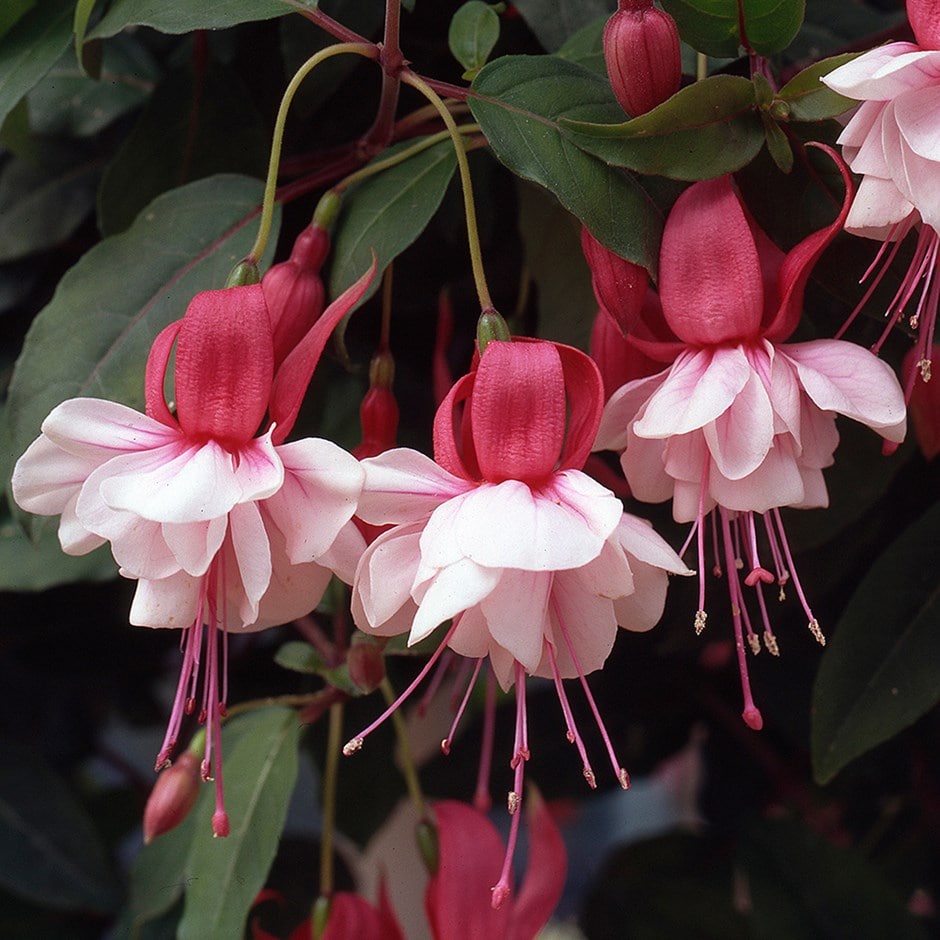Fuchsia 'Spion Kop'
fuchsia Spion Kop
- 9cm pot
- £4.19 £6.99
- In stock (shipped within 2-3 working days)
- 2 + 1 FREE 9cm pots
- £8.39 £13.98 £2.80 each
- In stock (shipped within 2-3 working days)
Delivery options
- Standard £5.99
- Position: full sun or partial shade
- Soil: moderately fertile, moist but well-drained soil, or general-purpose compost for containers
- Rate of growth: average
- Flowering period: June to October
- Hardiness: frost hardy (may need winter protection)
A stunning, deciduous, small shrub with an abundance of delicate, pendulous flowers. Each bloom is medium to large-sized and displays a striking two-tone coloration of lilac-mauve corollas and crimson sepals. The flowers are profuse and appear throughout the summer months, making Fuchsia 'Spion Kop' an excellent choice for adding seasonal colour to the garden.
This plant has an upright, bushy growth habit and produces small, slightly glossy, dark green leaves with a serrated edge. The foliage provides a beautiful contrast to the vibrant flowers, and the plant's stems are sturdy and woody, making it an excellent choice for container gardening or for growing as a specimen plant.
This plant has an upright, bushy growth habit and produces small, slightly glossy, dark green leaves with a serrated edge. The foliage provides a beautiful contrast to the vibrant flowers, and the plant's stems are sturdy and woody, making it an excellent choice for container gardening or for growing as a specimen plant.
For border planting, choose a sunny sheltered spot. Dig a hole twice the size of the rootball, scatter some mycorrhizal fungi on the roots and mix some well-rotted compost into the excavated soil and backfill.
For best results in containers, pot up using a good quality potting compost or or loam-based compost ensuring good drainage.
Fuschias require regular watering to aid establishment and during active growth. Apply a balanced liquid fertiliser each month.
Border plants benefit from mulching in winter for cold temperature protection. Prune in spring to maintain form and to encourage new growth.
Pot grown plants should be overwintered in a sheltered or frost-free spot, while those growing in borders will benefit from winter protection such as horticultural fleece.
For best results in containers, pot up using a good quality potting compost or or loam-based compost ensuring good drainage.
Fuschias require regular watering to aid establishment and during active growth. Apply a balanced liquid fertiliser each month.
Border plants benefit from mulching in winter for cold temperature protection. Prune in spring to maintain form and to encourage new growth.
Pot grown plants should be overwintered in a sheltered or frost-free spot, while those growing in borders will benefit from winter protection such as horticultural fleece.
- Humans/Pets: Fruit are ornamental - not to be eaten
